|
"Browne breede tostyd wyth hony in lyknesse of a butteryd loof" -Juliana Berners, writing ‘The Treatyse of Fysshynge wyth an Angle' 1496 the first known written mention on the delight of eating Bread and Butter. Under siege by Teutonic Knights in Northern Poland, Copernicus surmised that the soldiers holed up were dropping like flies from illness born by the bread that they schlepped up many stories over damp and soiled stones to the guard. His advice was to slather the bread in Butter, (plastic wrap being scarce), to coat the bread, and help indicate where it hit the ground. Slicing off the soiled parts became easy, and the butter also tastey. But, alas this mythology retold over centuries has largely been disproven. Neverheless Copernicus was not the first intellect to butter his bread. 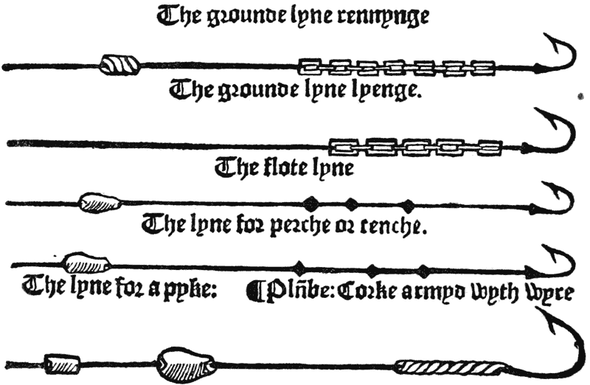 Tying Snells, (hooks) LInes, Weights and Floats. Note the bottom one for Pike has a leader wrappped in wire -- Nothing much has changed in 500 yrs. Tying Snells, (hooks) LInes, Weights and Floats. Note the bottom one for Pike has a leader wrappped in wire -- Nothing much has changed in 500 yrs. "Brown Bread toasted with honey, and Butter". What really could be better? We reach for so much, and strive daily for junk, and money, and strain to be heard from above the drone & chatter, of every conceivable machine and vice, but when we find silence, and slowly chew a crusty heel of fresh bread, perhaps still warm, spread thick with butter, can we know a better thing? I think not... Perhaps though, if this delight happens on a walk through a wood, toward a river where we tie a snell -- cast a line, and if lucky -- pull a fish from the shimmering cold water... Then we are whole. The thing with bread and butter, as with fishing, is that while wildly different -- we know our worth and at the moment we have both, we are wealthy. Value is what we take from something, and being connected to the un-contaminated simplicity of either fishing or eating the simplest of foods, brings true humble joy. "He sees the young swans, herons, ducks, cock, and other foul, which to me seems better than all the honks and blasts and horns and cries that hunters and falkers and foulers can make..." (the hunt can be tedious & tiresome, but) "...if a person takes a fish, then surely is there no man happier in this sport"? -JB Taken from the Middle English, it is without question that at least one other person (besides me) saw pulling a fish from the water to be a joyful moment. Simple fishing, or catching fish may reset a clock, as by Fishing while you may not have caught anything for hours, you may just sit upon a fallen tree, or stone to open your empty creel, unwrap a few simple slices of fresh bread slathered in butter. And... forget about the time? "Half a Mile from the County Fair And the rain came pouring down Me and Billy standing there With a silver half a crown Hands a' full of fishing rods And the tackle on our backs We just stood there getting wet With our backs against the fence" - Van Morrison "And it Stoned Me" In the original Middle English Text from this quintessential guide to angling, there is something far larger than positively liking to go fishing; perhaps larger than us. He seeth the yonge swannes : heerons : duckes : cotes and many other fou | les wyth theyr brodes. / whyche me semyth better than alle the {4} noyse of honndys : the blastes of hornys and the scrye of foulis that hunters : fawkeners & foulers can make. And yf the angler take fysshe : surely thenne is there noo man merier than he is in his spyryte. ¶ Also who soo woll vse the game of anglynge : he must ryse erly. whiche thyng is prouffytable to man in this wy | se / That is to wyte : moost to the heele of his soule. For it shall cause hym to be holy. and to the heele of his body / For it shall cause hym to be hole. 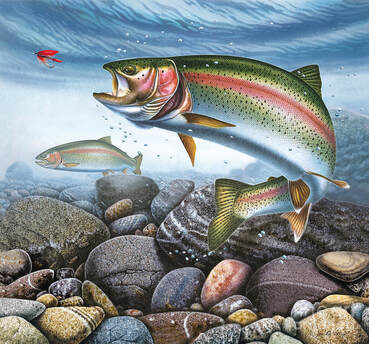 The fisherman could perhaps be bought for less than the fish -Juvenal The fisherman could perhaps be bought for less than the fish -Juvenal Surely then is there no man merrier than he is in his spirit..., For it shall cause him to be holy, and to heal his body, for it shall cause him to be whole." It's impossible to imagine such a thoroughly giddy incantation devoted to the basic pleasure of fishing. It seems ever more foreign to imagine an ode to fishing and well within it to find the first written nod to the beauty of Bread and Butter. The year was 1496, merely 4 years after a young Portuguese King set conditions upon Columbus to have a go at finding a new way to India. I suppose you could say that he failed, that trip, caught no fish along the way, and Bread and Butter rotted within each of three cramped galleons. Bread and Butter indeed, duly immortalized by Dame Juliana Berners well prior to anyone knowing about a New World. It's not at all odd that a great woman poignantly brought science to angling within an elegant outdoorsman manuscript, Showing readers how to fight a fish without breaking the line, How to make ones own hooks, bait, and how to tie flys… But what is miraculous, is to so plainly underscore the preparedness of a person who wanders off to catch fish. It is as if Joan Cleaver were telling the Beaver to remember his bagged lunch as he leaves for school. But it's not that simple is it? In one very elegant treatise on how to be an angler, Dame Berners bothers to mention that Bread and Butter may raise the zen of angling many fold. Or at least in itself, it's important to consider your hunger, and the likelihood you may not catch any fish, and so don't forget your bagged lunch. So what is there in either which makes them magic? First there is Angling... Catching a fish is really never boring. Losing time, is a funny thing today, as we used to relish wasting time, caught up in headphones, or a good film, and today things tend to blur. While truthfully -- Casting, and sitting, and losing a lure or many snells is about as fun as sitting upon a cold stool in a frozen shanty on an icy lake in mid-winter. There is nothing more frustrating than setting out to Fish, or doing anything and returning in absolute failure. Fishing may be frustrating and even demoralizing, at times... but as one soon learns, empty handed fishing trips are still better than a productive day at work. And then there is the miracle combination of Bread and Butter. Bread and Butter, like a candy-bar midway through a bike race, or Champagne upon a celebration become some of our memorable incentives to carry on. But bread and butter are a bit more than that. This dynamic duo, is nearly un-rivaled in a century or evolution. If you don't have some, then forget about your resolutions, and your fake aversion to Gluten, and get, buy, bake or steal some, and then find the best full butter-fat you can procure, Plugra & Kerry Gold being common -- And then do nothing more than lay it on thick to remind yourself of what it means to be truly completely content with two simple things. The Beauty of Gutenberg.org where this angling book is published, is that you can discover a many thousand books for free without restriction to consider quote or copy. Free! Here is an excerpt by M.G. Watkins preface which explains why this consummate manual on angling was so thoroughly plagiarized and revered as the ultimate canon of fishing craft: "Many pure and noble intellects have kindled into lasting devotion to angling on reading her eloquent commendation of it. Such men as Donne, Wotton, and Herbert, Paley, Bell, and Davy, together with many another excellent and simple disposition, have caught enthusiasm from her lofty sentiments, and found that not their bodily health only, but also their morals, were improved by angling. It became a school of virtues, a quiet pastime in which, while looking into their own hearts, they learnt lessons of the highest wisdom, reverence, resignation, and love—love of their fellow-men, of the lower creatures, and of their Creator." It may seem a surprise that someone writing a guide to fishing in the fifteenth century could kindle such philosophic ideals amidst learned men. But its not surprising that they all took the best from this treatise, without giving credit to it's author. But this Treatise on Angling, is not merely a manual to teach the craft of fishing, rather more a moral guide, and perhaps the first book of rules on naturalism, environmentalism, and maintaining good character. Again I quote the Preface: "The last two pages of the book give us a portrait of her conception of the perfect angler, and it is no presumption to say that a nobler and truer picture has never been lined. Simplicity of disposition, forbearance to our neighbours’ rights, and consideration for the poor, are strongly inculcated. All covetousness in fishing or employment of its gentle art to increase worldly gain and fill the larder is equally condemned. She holds the highest view of angling; that it is to serve a man for solace, and to cause the health of his body, but especially of his soul. So she would have him pursue his craft alone for the most part, when his mind can rise to high and holy things, and he may serve God devoutly by saying from his heart his customary prayer. Nor should a man ever carry his amusement to excess, and catch too much at one time; this is to destroy his future pleasure and to interfere with that of his neighbours. A good sportsman too, she adds, will busy himself in nourishing the game and destroying all vermin". May I remind you once more, that this was penned around 1494 or 5, and published as part of a larger volume of sportsman's guides in 1496. So there it is a primer to being a better person through fishing. Not the sportsman angling on a TV program with sonar, radar, and the chatter of motors... But the sublime contemplation of worldly things, whilst casting a line. "So we jumped right in and the driver grinned and he dropped us up the road and we looked at the swim and we jumped right in not to mention fishing poles ...and it stoned me to my soul" -Van Morrison
0 Comments
Leave a Reply. |
Age and Treachery will overcome youth and skill. Archives
January 2024
Categories |
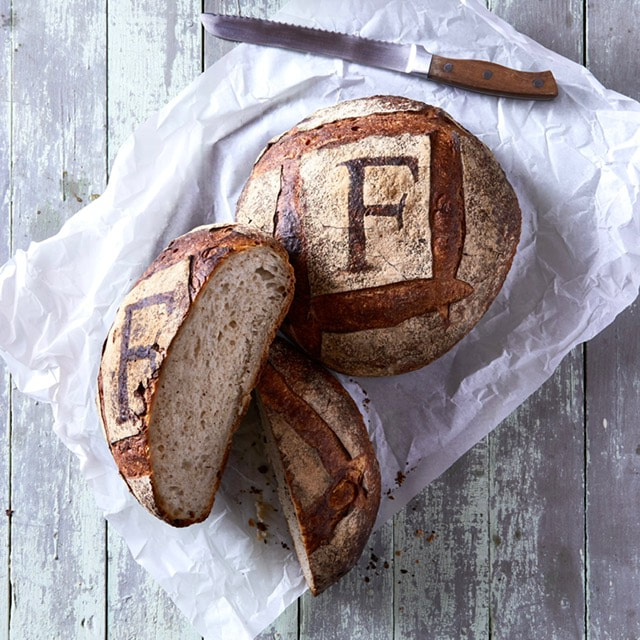
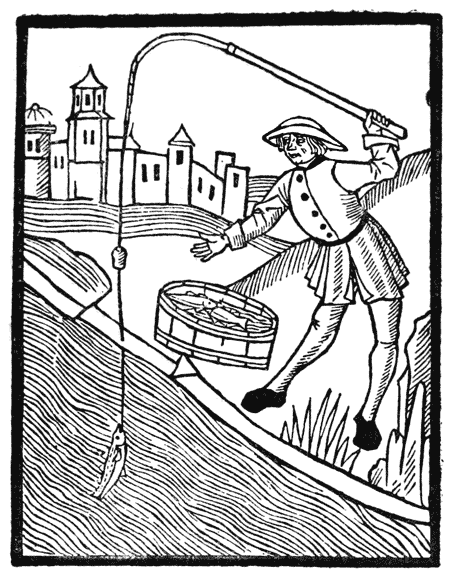
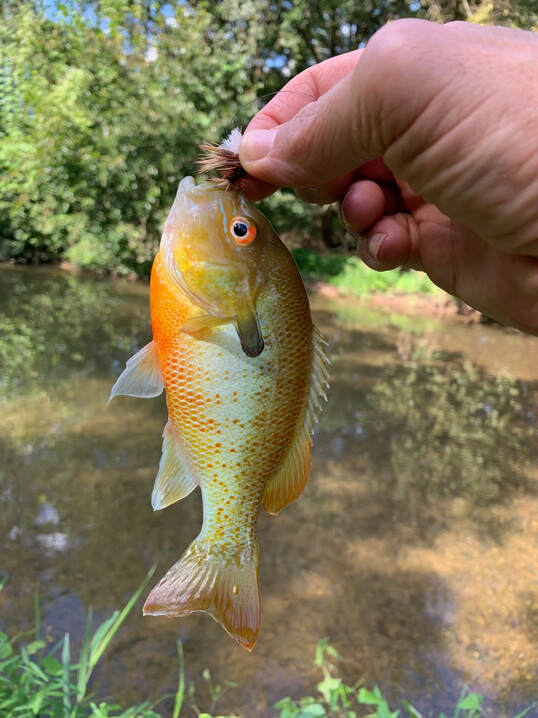
 RSS Feed
RSS Feed